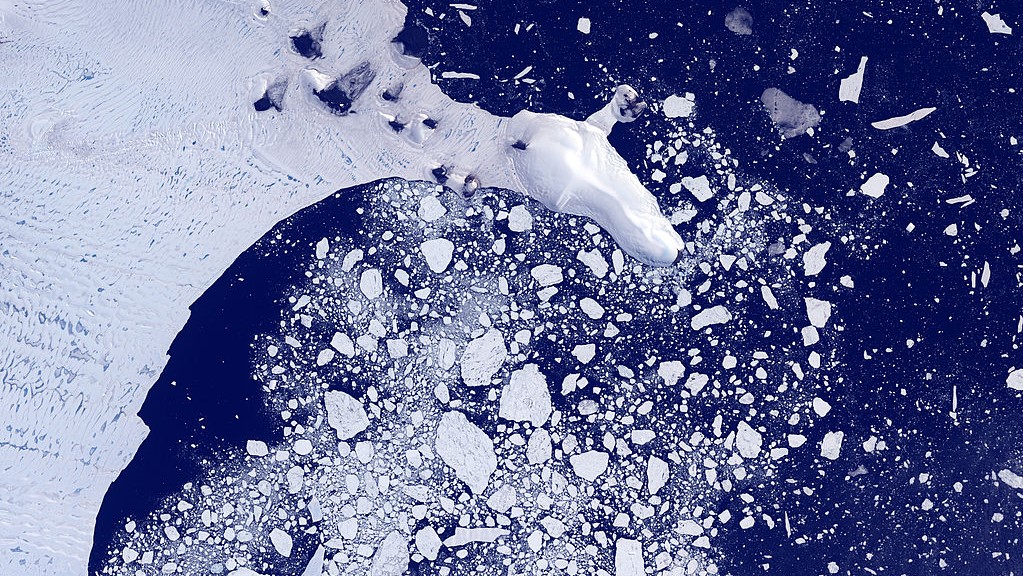Antarctic currents supplying 40% of world's deep ocean with nutrients and oxygen slowing dramatically
These deep ocean tides supply almost half of the world's oceans with vital nutrients and oxygen, but melting ice shelves are slowing them down.

Deep ocean currents around Antarctica that are vital to marine life have slowed by 30% since the 1990s and could soon grind to a complete halt, a new study finds.
These currents, known as Antarctic bottom waters, are powered by dense, cold water from the Antarctic continental shelf that sinks to depths below 10,000 feet (3,000 meters). The water then spreads north into the Pacific and eastern Indian oceans, fueling a network of currents called the global meridional overturning circulation and supplying 40% of the world's deep ocean with fresh nutrients and oxygen.
But warming global temperatures are unlocking large volumes of less-dense fresh water from the Antarctic ice shelves, slowing this circulation down.
"If the oceans had lungs, this would be one of them," Matthew England, a professor of ocean and climate dynamics at the University of New South Wales in Sydney, Australia who contributed to the research, said in a statement. Researchers in the U.K. and Australia collaborated in a study published in March in the journal Nature that predicted a 40% reduction in the strength of Antarctic bottom waters by 2050.
He also warned that the currents could eventually stop altogether. "We are talking about the possible long-term extinction of an iconic water mass," England said.
In a new study published Thursday (May 25) in the journal Nature Climate Change, England and his colleagues say they have confirmed these predictions with real life observations in the Australian Antarctic Basin, which spans the polar waters between Australia and Antarctica.
Related: How a hidden ocean circulates beneath the Antarctic ice
Sign up for the Live Science daily newsletter now
Get the world’s most fascinating discoveries delivered straight to your inbox.
The researchers examined changes in the amount of bottom water entering the basin between 1994 and 2017 and recorded a 30% reduction in velocity, which suggests that these deep ocean, or abyssal, currents, are beginning to stagnate.
Dwindling circulation around Antarctica could slow down the global network of abyssal currents and trap nutrients and oxygen in the ocean depths, with knock-on effects for marine life and productivity.
"The thing about the oceans is that all of the marine life that we have at the surface, when it dies off, it sinks to the bottom of the ocean, so there's a lot of nutrient-rich water in the ocean abyss," England said in a video produced by the Australian Academy of Science. "If we slow down the overturning circulation that brings that very bottom water back up to the surface, we cut off a way that nutrients get back to the surface to regenerate marine life."
Roughly 276 trillion tons (250 trillion metric tons) of cold, salty, oxygen-rich water sinks around Antarctica each year, according to the new study. In a warming climate, fresh meltwater reduces the density of this sinking mass, meaning that more of it stays in the upper layers of the ocean. "These regions supply the abyssal waters of the entire Pacific and the eastern Indian basins, so the changes quantified here are likely to impact a large fraction of the global abyssal ocean," the researchers wrote.
The scientists warned that fresh water entering Antarctic waters will likely continue and accelerate in the coming decades, meaning that these vital currents could soon collapse. "Such profound changes to the ocean's overturning of heat, freshwater, oxygen, carbon and nutrients will have a significant impact on the oceans for centuries to come," England said.
The new findings reinforce the dramatic estimates researchers made earlier this year, said Ariaan Purich, a researcher at Monash University's School of Earth, Atmosphere and Environment in Australia who was not involved in the research.
"This new study is significant because alongside a recent landmark modeling study, it provides further support including observational evidence that the melting Antarctic ice sheet and shelves will impact the global ocean overturning circulation, with important impacts to the ocean uptake of heat and carbon," Purich told Australia's Science Media Exchange.

Sascha is a U.K.-based staff writer at Live Science. She holds a bachelor’s degree in biology from the University of Southampton in England and a master’s degree in science communication from Imperial College London. Her work has appeared in The Guardian and the health website Zoe. Besides writing, she enjoys playing tennis, bread-making and browsing second-hand shops for hidden gems.










